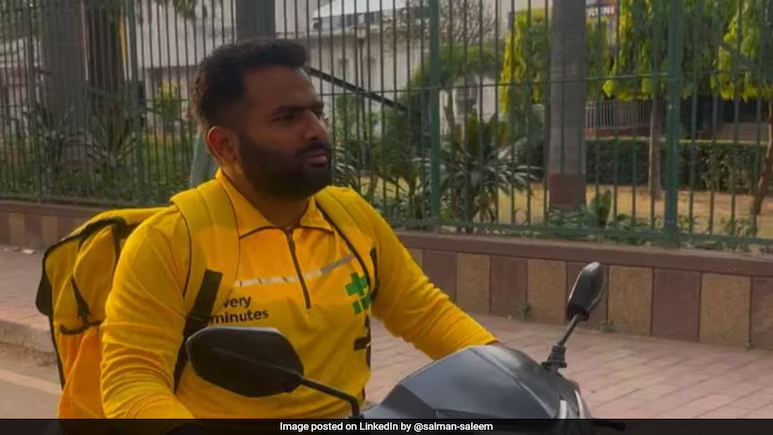Delhi Man Reveals ‘Untouchability’ Faced While Working One Day as Delivery Agent

Delhi Man’s ‘Untouchability’ Experience Goes Viral After One Day as Delivery Agent
In a powerful social media post that has now gone viral, a man from Delhi narrated his troubling experience of caste-based discrimination—or untouchability—after working as a delivery agent for just one day. His account has sparked widespread conversation around the social stigma still faced by gig workers in modern India, shedding light on the intersection of caste, class, and labor.
The man, who undertook the task as a form of social experiment and personal curiosity, didn’t expect that a single day on the job would reveal the deep-rooted casteism that still permeates Indian society—even in urban areas.
The Viral Social Media Post
The incident came to light when the Delhi-based man took to social media platform X (formerly Twitter) to document his experience. The post detailed how multiple customers hesitated to come close to him when receiving their food deliveries, how one household even used a utensil to take the delivery parcel without touching him, and how another scolded him for “standing too close” to their gate.
“I worked as a delivery agent for a day. What I experienced wasn’t just about class—people treated me like I was untouchable. I’m still in shock,” the post read.
The thread quickly gained traction, receiving thousands of retweets, likes, and comments. Many users were quick to condemn the behavior, while others shared similar experiences or pointed to the deep societal issues that still remain unaddressed.
Gig Work and Social Stigma
In India, delivery agents are an essential part of the fast-growing gig economy. Whether it’s food, groceries, or e-commerce packages, millions of people rely on delivery workers every day. Yet, despite their vital contribution, these workers often face poor working conditions, lack of job security, and very little social respect.
The man’s post reveals that beyond economic exploitation, delivery workers—especially those from marginalized communities—also bear the brunt of caste-based discrimination.
This is not the first time such behavior has come under scrutiny. In recent years, there have been multiple reports of delivery workers being refused entry into apartment complexes, being made to wait far from the main doors, or being spoken to in a disrespectful manner.
A Deep-Rooted Issue
While India has legally abolished untouchability under Article 17 of the Constitution, caste discrimination is still prevalent in subtle and overt ways. The urban setting may offer a facade of modernity and equality, but incidents like this highlight that regressive mindsets continue to exist beneath the surface.
Sociologists argue that casteism has merely adapted to modern times—it may not always manifest as outright violence or segregation, but in everyday interactions, body language, and tone, the bias is clear.
The incident is a reminder that the “invisible walls” created by caste are still very real for many Indians, even in metropolitan cities like Delhi.
Support and Outrage
The post received a flood of support from activists, journalists, and citizens who condemned the discriminatory behavior. Hashtags like #CasteismStillExists, #Untouchability, and #RespectGigWorkers began trending shortly after.
Dr. B.R. Ambedkar’s teachings were widely referenced in the discussion, with users pointing out how his warnings about caste oppression still ring true today.
One user wrote:
“We talk about Digital India, but how can we move forward when people still treat others as untouchables in 2025?”
Another added:
“This is why caste-based data is important. The oppression is still there—it’s just more hidden now.”
Delivery Platforms Respond
In response to the viral thread, several users tagged major delivery platforms such as Swiggy, Zomato, and Blinkit, urging them to provide better support, training, and respect for their delivery personnel.
While no official statement was released at the time of writing, a former delivery executive shared his opinion in the comments, saying:
“This happens all the time. We are told not to argue with customers. But what do you do when someone treats you like dirt?”
This aligns with past reports of systemic challenges in the gig economy. According to a report by Oxfam India, marginalized communities and workers from lower castes face structural disadvantages in employment and wages, even in the informal sector.
Reactions From Experts and Activists
Social commentators and caste activists have long warned about the “invisible apartheid” in Indian cities. Dalit activist Anita S. said in an interview:
“People think untouchability doesn’t exist in cities, but it has just changed form. It’s no longer about village wells or temples—it’s now about who delivers your food, who cleans your office, who you won’t shake hands with.”
Legal experts say there’s little recourse for workers who face such social discrimination, as it falls outside the traditional definitions of workplace abuse—especially when the “workplace” is a customer’s home.
A Call for Change
The incident is yet another wake-up call for Indian society. While legal measures exist to combat caste discrimination, what is needed is a cultural shift—a change in how we view labor, dignity, and equality.
Here are a few key takeaways that emerged from the discussion:
- Respect gig workers: They are not “less than” because they perform manual tasks.
- Raise awareness: Schools, colleges, and workplaces need to talk about modern forms of casteism.
- Push for policy reforms: Delivery companies must include caste-sensitivity training and support structures.
- Speak out: Sharing these stories is the first step to combating discrimination.
Final Thoughts
The Delhi man’s one-day stint as a delivery agent became a mirror to a reality many would rather ignore. It exposed not just class-based snobbery but the darker, more systemic issue of caste discrimination. As India marches toward progress and digitization, it cannot afford to carry forward the centuries-old baggage of untouchability in any form.
Real change begins when society no longer turns a blind eye. And sometimes, it takes just one viral post to stir the conscience of a nation.






